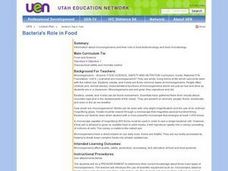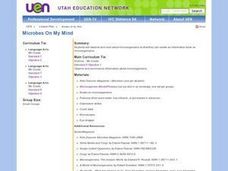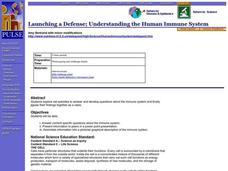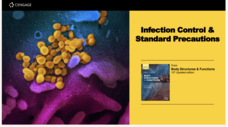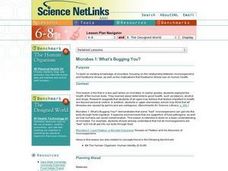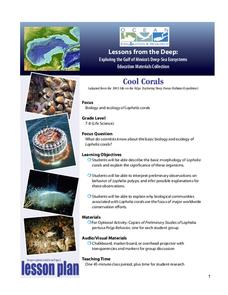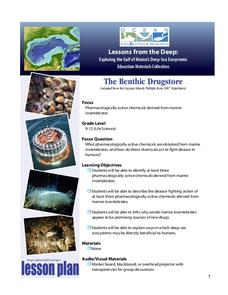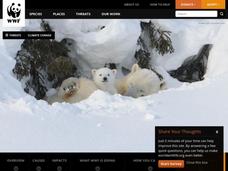Curated OER
Microorganism Multiplication
Sixth graders explore biology by viewing video clips in class. In this microorganism identification lesson, 6th graders identify the types of organisms that can feed small animals such as algae and protozoans. Students view video clips...
Curated OER
Bacteria's Role in Food
Students grow bacteria cultures on agar in petri dishes and do a plate count. They participate in a yogurt making lab to see how bacteria produce lactic acid. They prepare a recipe and identify fungi, fermentation and the role of...
Curated OER
Yeasts and Molds
Students investigate the characteristics and nature of yeast and molds help to explain how these microorganisms affect food production. They experiment with yeast in sourdough in preparing sourdough pancakes.
Curated OER
Things Living in a Pond
Ninth graders observe, compare, and classify various microorganisms using a microscope. They answer discussion questions, and record their observations on a chart.
Curated OER
The Good, the Bad and the Both
Students use information from articles about microorganisms and their prior knowledge to identify both the positive and negative aspects of microorganisms.
Curated OER
Microbes on My Mind
Young scholars observe and read about microorganisms so that they can create an information book on microorganisms.
Curated OER
Launching a Defense; Understanding the Human Immune System
Students research online to answer and develop questions about immune system, create Powerpoint presentation to share information with classmates, and assimilate information into pictorial and/or graphical description of immune system.
Curated OER
Launching a Defense; Understanding the Human Immune System
Students research online to answer and develop questions about immune system, create Powerpoint presentation to share information with classmates, and assimilate information into pictorial and/or graphical description of immune system.
Curated OER
Creatures in Torch Lake
Students investigate pond ecology. They gather water samples from various sources, add grass, and let it sit for a week. Afterward, using microscopes, they identify the microorganisms present in the sample.
Cengage Learning
Infection Control and Standard Precautions
With the number of COVID-19 cases rising dramatically, information about how standard precautions can be used to control infection is essential. The 16 slides in a presentation outline of how people need to change their daily habits to...
Curated OER
Diseases
Sixth graders create a type of notebook or journal using colored copy paper on which to take notes. They complete research on a certain disease and report on it and then design their own disease causing bacteria or virus. Finally, 6th...
Curated OER
MICROBES 1: WHAT'S BUGGIN YOU?
Students use existing knowledge of microbes, focusing on the relationship between microorganisms and foodborne illness, as well as the implications that foodborne illness has on human health.
Curated OER
Microbes: Louis Pasteur - A Microbe Discoverer
Young scholars study Louis Pasteur and the process of pasteurization in controlling microbes. In this pasteurization lesson plan, students discuss microorganisms and how they can affect health. They discuss Louis Pasteur and research his...
Curated OER
Microbiology Lesson Plan Aseptic Technique
Pupils examine the importance of aseptic technique, become familiar with media plates, and general microbiology techniques. They study the benefits and dangers of bacteria and other microorganisms in their lives.
Curated OER
What is Microbiology?
Young scholars demonstrate knowledge of important advances in microbiology by creating a timeline of microbiological milestones. Student also demonstrate application of the many milestones in microbiology by researching and reporting on...
Growing Classroom
Space Travelers
Groups of three scientists from the rocky planet Zog investigate the composition of soil so that they can take the information back to their home, create soil there, and begin to grow food.
NOAA
Deep-Sea Ecosystems – Cool Corals
Young oceanographers research deep sea corals that thrive on chemosynthesis. The lesson focuses on the biology of the animal, preferred habitat, associations, and interactions.
NOAA
Importance of Deep-Sea Ecosystems – Chemists with No Backbones
Marine invertebrates offer us many new options for developing pharmaceutical drugs, such as w-conotoxin MVIIA, which is extracted from the cone snail and is a potent painkiller. The lesson encourages scholars to research various types of...
NOAA
Importance of Deep-Sea Ecosystems – The Benthic Drugstore
You never know what you will find next in the deep sea ecosystem. So far, scientists have found items that work as anti-tumor agents, anti-inflammatory agents, agents that stop uncontrolled cell division, and much more. The lesson begins...
NOAA
Deep-Sea Ecosystems – Entering the Twilight Zone
Imagine an ecosystem without any light or oxygen, where living things convert carbon dioxide into food. This ecosystem is thriving and might just be the largest ecosystem on our planet, yet we know very little about it. The lesson...
NOAA
Deep-Sea Ecosystems – Life is Weird!
A pool of brine in the deep sea can be up to four times as salty as the surrounding sea water. The deep sea ecosystem relies on chemosynthesis and the organisms that live there are often strange to us. The lesson focuses on researching...
NOAA
Deep-Sea Ecosystems – A Tale of Deep Corals
Many have debated which came first, the chicken or the egg, but this lesson debates which came first, the hydrocarbons or the carbonate reef. After a discussion on deep-sea corals, scholars receive a set of questions to research and...
Curated OER
Wildlife Variety Show: Biodiversity In Illinois
Eighth graders write a short report in first person about any plant or animal found on a list of Illinois species. They become the character of the plant or animal and give a short report describing the plant or animal.
Curated OER
Climate Change And Disease
Students consider the role of climate change in the occurrence of vector born diseases such as malaria. In small groups, they research a specific vector to complete an information chart on climate changes in the region where the vector...
Other popular searches
- Pond Water Microorganisms
- Classifying Microorganisms
- Microorganisms and Food
- Soil Microorganisms
- Good and Bad Microorganisms
- Stage 4 Microorganisms
- Microorganisms Sheets
- Lesson on Microorganisms
- Microorganisms Read Aloud
- Marine Microorganisms
- Gram Stain Microorganisms
- Microorganisms Use Citrate



